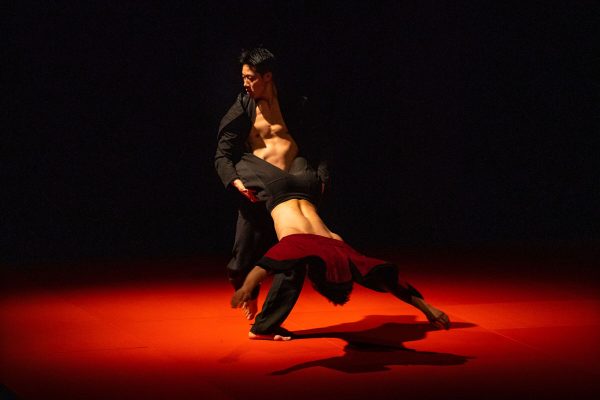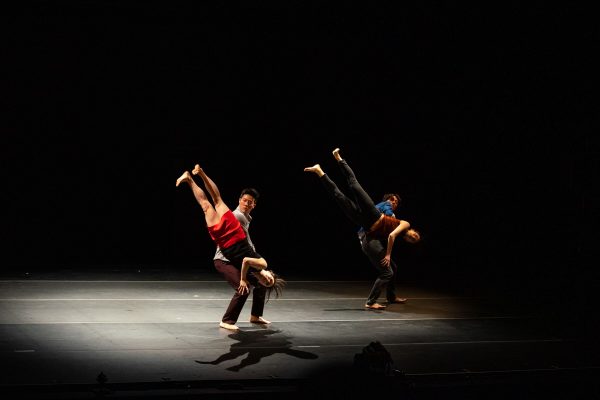Dance Review: Korea’s Bereishit Dance Company — Addressing Violence, Beautifully
By Jessica Lockhart
The amazing Bereishit Dance Company asks how dance fits into the physical world.
Bereishit Dance Company presented by Celebrity Series at NEC’s Plimpton Shattuck Black Box Theatre, Boston, MA, February 8 and 9

Bereishit Dance Company in action at the Plimpton Shattuck Black Box Theatre. Photo: Robert Torres.
The word Bereishit, translated from the Korean, means “in the beginning” and it’s an apt name for a dance company that explores the complex relationship between nature and the human body. The Korean troupe doesn’t just wonder how stage space shapes contemporary dance. It asks how dance fits into the physical world.
The first dance presented, Judo, began in silence on a red gymnastic mat that covered the stage. One male dancer scooped up another dancer and placed him upside down. He was balanced on his head. The pair meditatively spun as if in a slow-motion breakdance routine. Suddenly, four others rushed onto the stage and lifted their arms and slammed their hands down onto the mat with great force — there were loud whaps. This thundering action was repeated over and over; apparently, it was to dramatize the senselessness of violent acts. But the repeated action seemed to also tap into the competitive energy of sport. Drumming music was introduced, which set a very rhythmic tempo that set the six men into nonstop movement. It was a collective drive toward exhaustion.
The program notes state that “violence is a human instinct … and sports provided opportunities to release violence.” In another part of the piece artistic director Soonho Park drew on the martial arts credo of Judo: to use your opponent’s force to take them down rather then oppose them directly. This more subtle way of addressing violence was used to great effect. The men partnered in a cooperative way that made them look light, not heavily muscle-bound. Then the dancers squared off, slowly swaying back and forth, as if waiting for their best chance to strike. These stand-offs evolved into a succession of beautiful partnering sequences that were completed with enormous precision and speed. The dancers made their challenging movements look effortless: bodies flipped over the backs of other bodies, men were tossed and caught after flying unaided through the air. The performers’ strength and grace was amazing.

Bereishit Dance Company in action at the Plimpton Shattuck Black Box Theatre. Photo: Robert Torres.
The drumming music intensified, to which was added the sound of breathing. The dancers began running across the stage, jumping up and over the heads of others in attempts to knock them to the ground. These conflicts were repeated by the performers, the “attacks” coming from a number of different angles. It was breathtaking to see how the violence was so well timed, so aesthetically appealing. The “contest” continued to the end, when only one dancer was left. He kept getting up, even after he had been knocked down. But he was obviously becoming tried, fatigue setting in as the drumming faded and the breathing sounds slowed down. At the end, he was left, spent, waiting for his next opponent.
The second dance, Balance & Imbalance, featured live music by two Korean drummers and a singer. The musicians wore tradition Korean clothing and were seated on the side of the stage. In contrast, the five dancers wore contemporary outfits, causal pants and shirts. As the dancers moved, the singer began to tell a ancient story from the Korean Pansori tradition, about a Dragon King and a rabbit. A dancer took on the roles of the yarn’s animals. He mimicked being a powerful dragon and then transformed into a hunted rabbit, diving and rushing around to avoid being caught and eaten. The ensemble work in this piece was mesmerizing. The two female dancers showed the same impressive strength and physical control as the men. The story gave Park a powerful opportunity to show off his mastery of choreography that builds momentum and suspense.
Bereishit Dance Company was founded in 2011; this was their Boston debut. The dancers in both pieces were outstanding. Performing were: Cheolin Jeong, Jaewoo Jung, Gyungiae Mun, Hyundo Jo, Youngsang Ju, Yuneseung Doh, Chorong Oh, and Hyeayoon Kim.
Jessica Lockhart is a National Endowment for the Arts Fellow in Dance Criticism and has a BA in Communication from the University of Southern Maine. Lockhart is a Maine Association of Broadcasters award-winning independent journalist. Currently, she also works as program director at WMPG Community radio.

Wonderful review— I could picture the dances you describe vividly. I only wish that I had attended this concert.
Thank you,
Mary Paula Hunter
[…] Read the full review here. […]